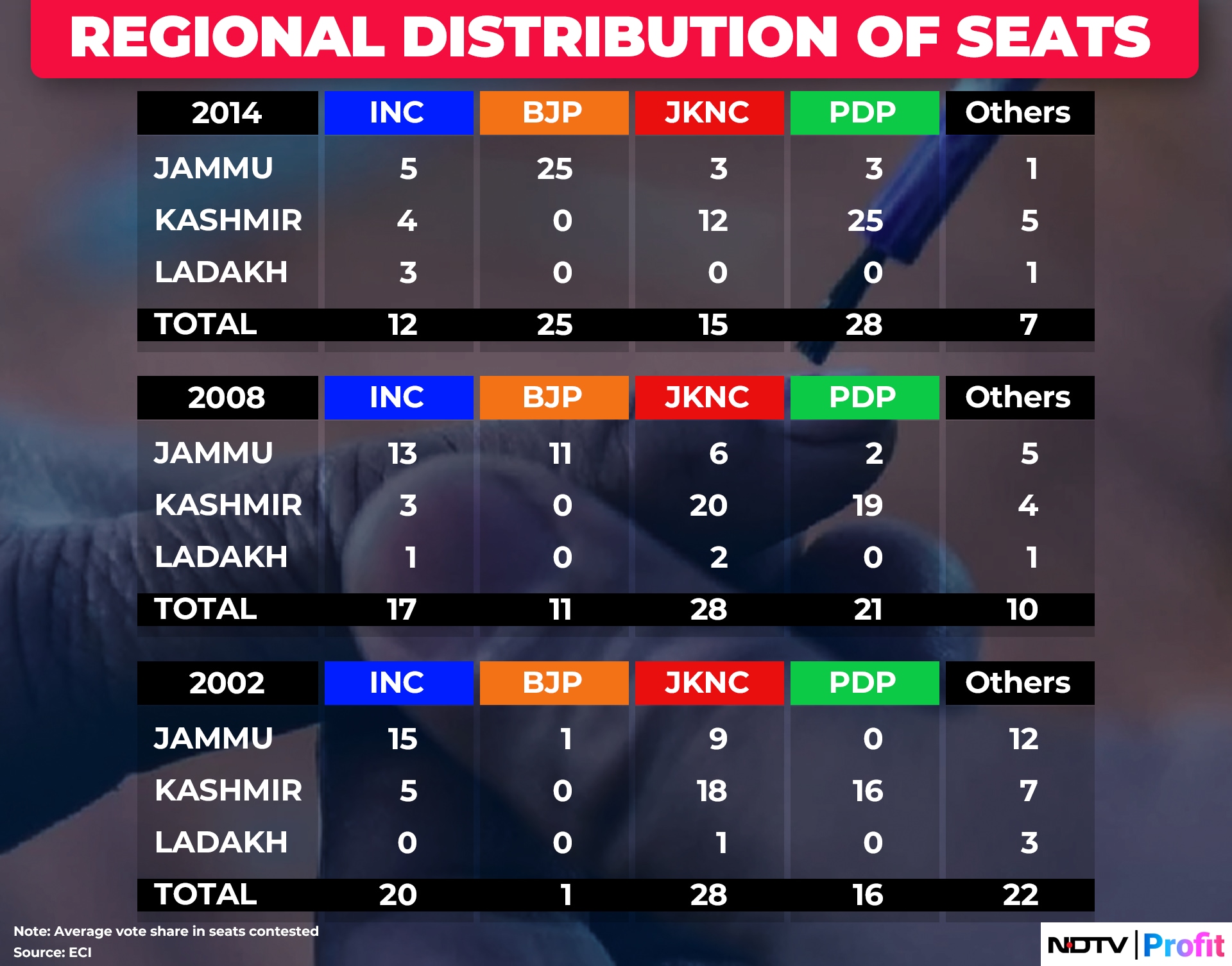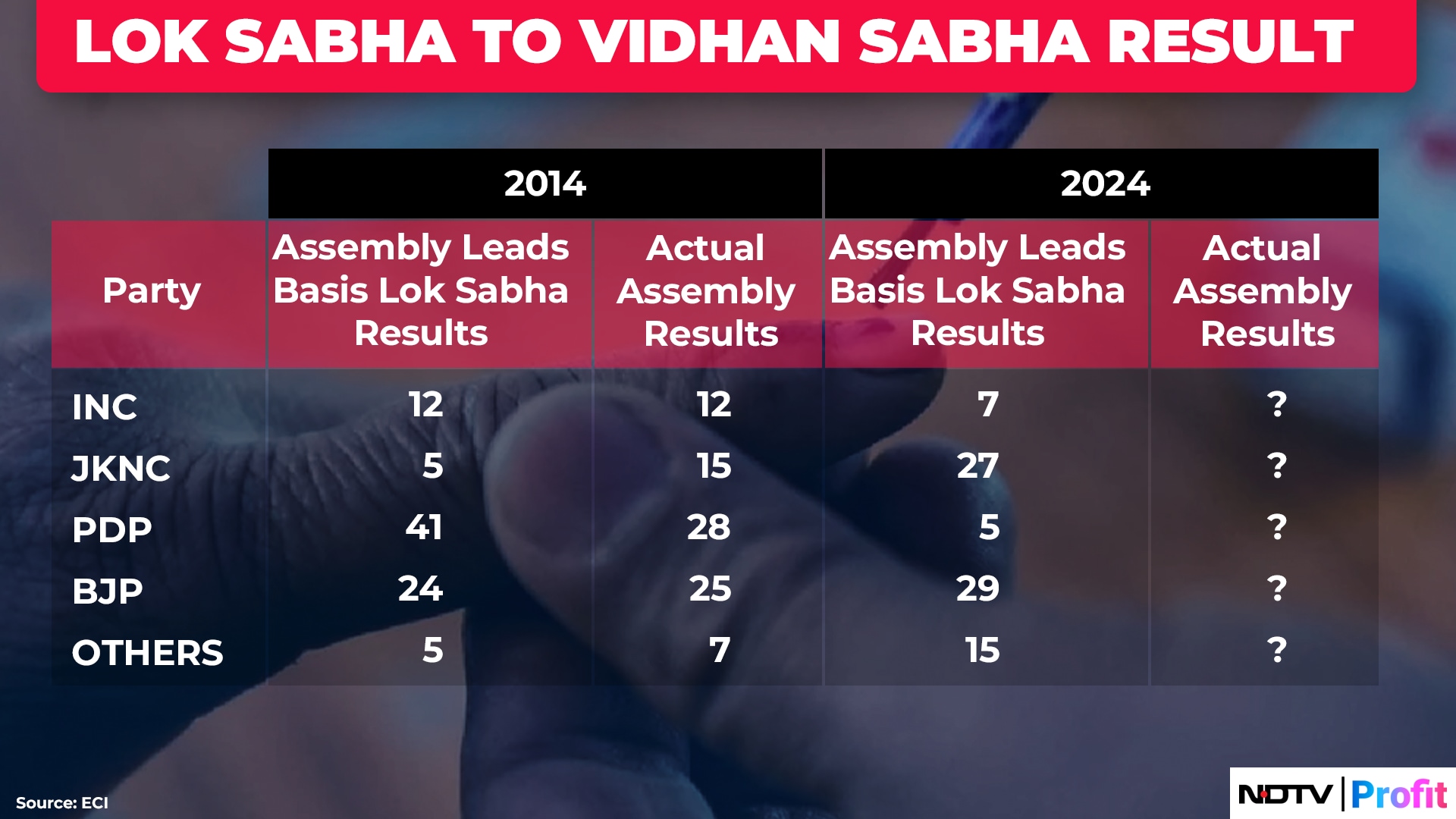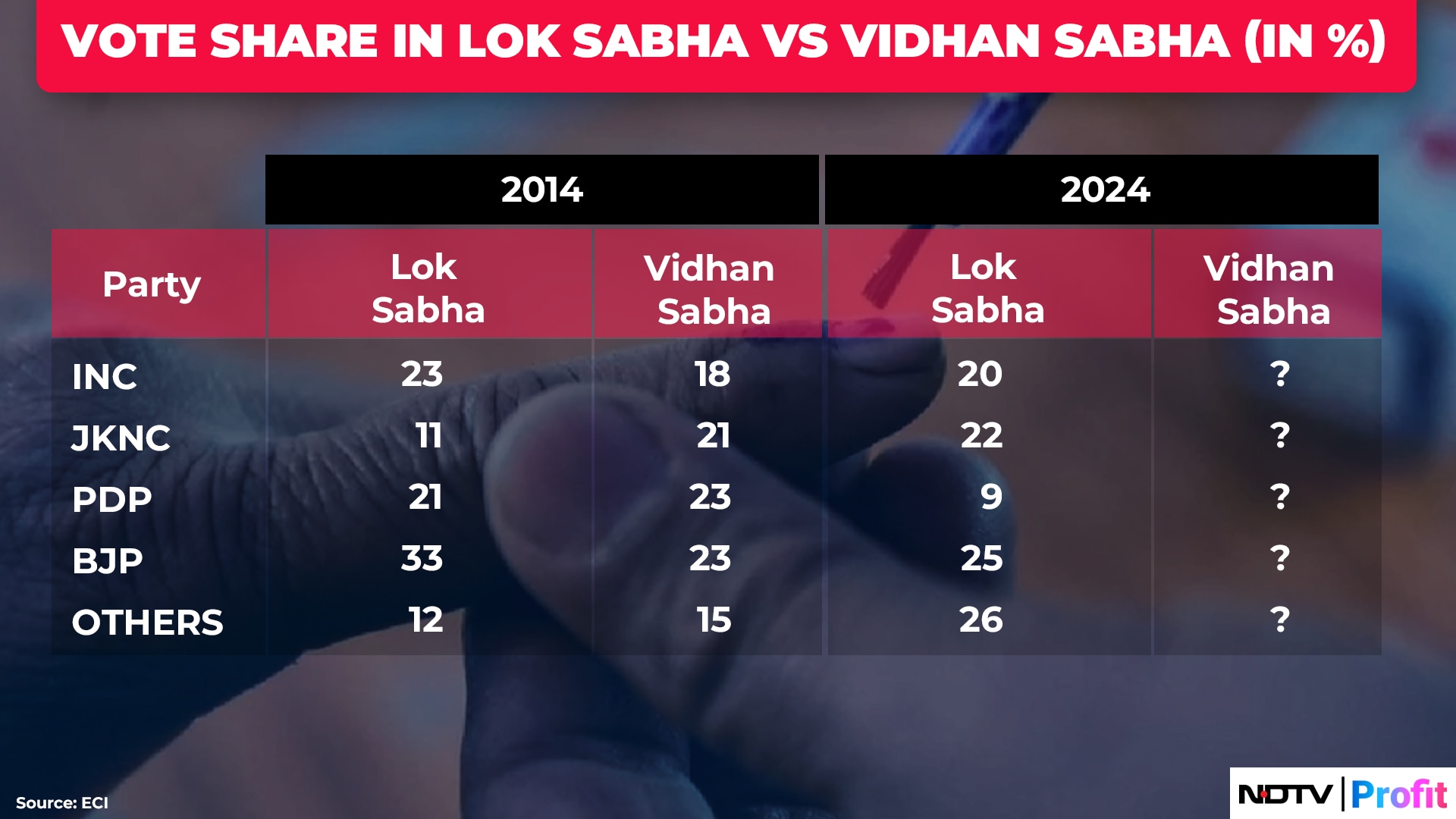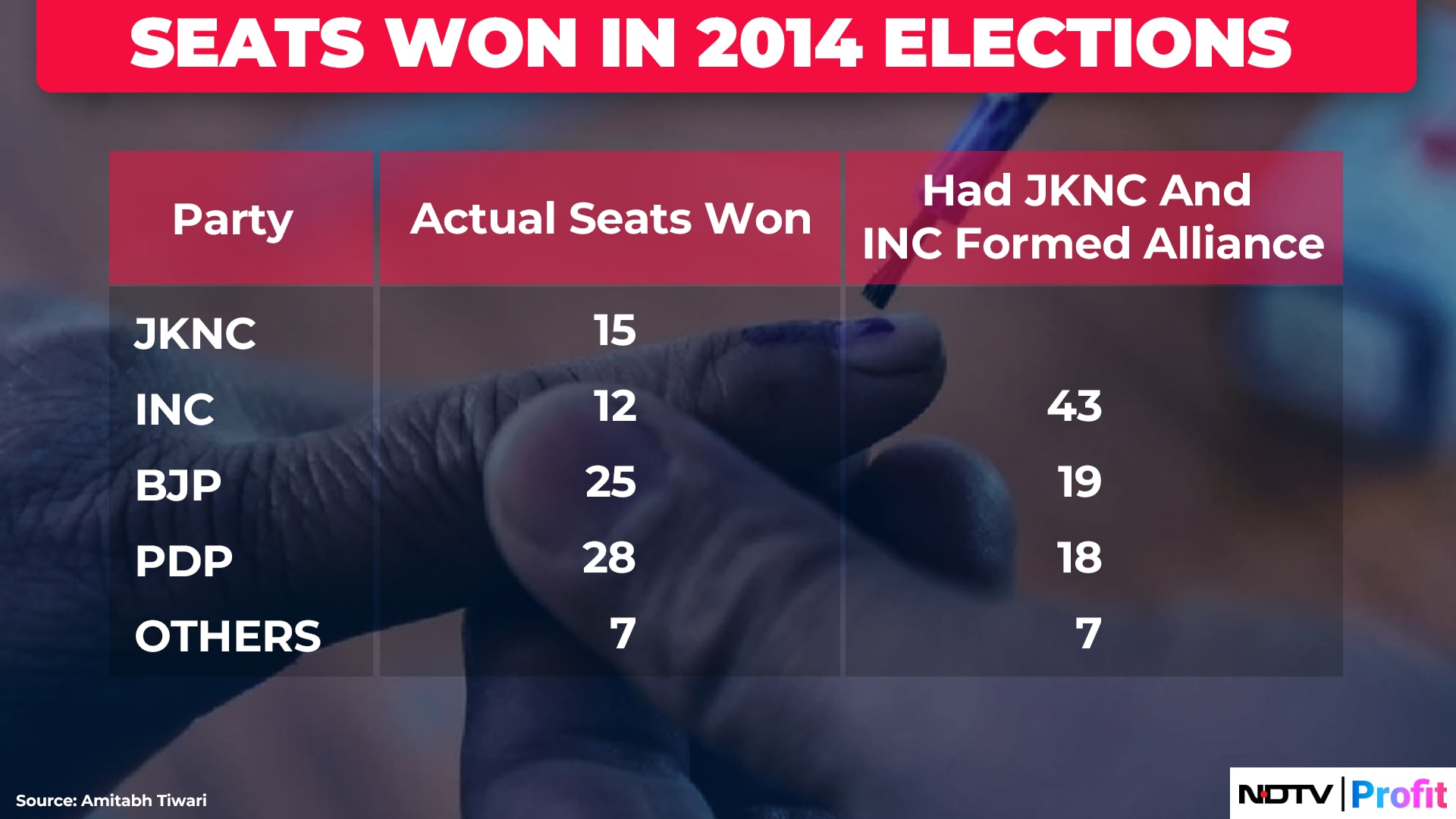.png?downsize=773:435)
The Indian National Congress and Jammu & Kashmir National Conference have formalised a seat sharing plan for the upcoming elections in the union territory, continuing with their alliance of general elections 2024.
This assumes significance as J&K has witnessed a quadrangular contest in the last three polls in 2002, 2008 and 2014—throwing up hung assemblies with no party getting a simple majority.
None of the parties have presence across the UT, with regional parties JKNC and Jammu & Kashmir People's Democratic Party restricted to Kashmir valley, while national parties Bharatiya Janata Party and INC restricted to Jammu region.
This alliance hopes to break the trend, riding on pockets of strength of JKNC in the Kashmir valley and INC in the Jammu region.
The structure of the assembly—47 seats in Muslim dominated Kashmir and 43 in Hindu dominated Jammu—makes it very difficult for a party to win a majority in J&K, as reflected in the results in this century. JKPDP and JKNC largely win seats in Kashmir while INC and BJP largely in Jammu.
Regional Variations: Two States Into One
Prior to abrogation of Article 370 in 2019 and revocation of special status, J&K had 87 seats, Kashmir Valley had 46, Jammu region had 36 and Ladakh had four seats.
The state was split into two UTs—J&K and Ladakh. With Ladakh out, a delimitation was carried out, in which the seats were increased to 90. Now Kashmir valley has 47 (+1) and Jammu 43 (+6) seats. The Jammu region, which has a Hindu majority, has seen an increased share of seats from 42.5% to 47.8%.
BJP has never won a seat in the Kashmir valley, while majority of JKPDP/JKNC weak seats are in Jammu. INC, also, has won few seats in Kashmir.
 (1).png)
In 2002 and 2008, there was a tough fight between JKNC and PDP in the Kashmir valley. While JKNC won 18 seats, PDP won 16 seats in the valley in 2002. In 2008, while JKNC won 20 seats, PDP won 19 seats in the valley. In 2014, PDP led handsomely winning 25 seats, while JKNC won 12 seats in the valley.
In 2002, INC won 15 and JKNC nine seats in the Jammu region. In 2008, there was a tough fight between INC and BJP in the Jammu region. While INC won 13 seats, BJP won 11. In 2014, BJP swept the Jammu region winning two-third of the seats—25 out of 37.

Do Lok Sabha Trends Hold In Vidhan Sabha?
In 2024 general elections, JKNC and INC contested in alliance as part of INDIA bloc, with the Farooq Abdullah-led party contesting three seats in Kashmir and Congress going for two seats of Jammu. Both the INDIA and BJP led NDA blocs won two seats each, while an independent candidate won a single seat.
In terms of vote share, JKNC bagged 22%, Congress got 19%, BJP 24% and PDP 8%. There was an increase in turnout in Kashmir, and a marginal decline in Jammu, which already recorded 65% plus voting percentages.


A key takeaway also is the fact that stalwarts like PDP chief Mehbooba Mufti and JKNC's Omar Abdullah lost the elections in Kashmir, and newer parties, newer faces are getting traction. The youth, in particular, is looking at alternatives away from legacy parties.
In terms of assembly leads, while BJP led in 29 seats, JKNC gained in 27 seats, Congress in seven, PDP in five and others in 15 seats. INDIA bloc was leading in 32 seats. Leads of JKNC, others and PDP all came from Kashmir, while Congress and BJP gained from Jammu.
Will these leads hold as elections are happening in three-four months? Trends of 2014 Lok Sabha and Vidhan Sabha elections show that due to the local nature of polls, the trends may not mirror, and can even change.
In 2014 Vidhan Sabha polls, PDP won just 28 seats while it was leading in 41 seats in Lok Sabha polls. BJP and Congress almost held their tally of 24 and 12 seats. JKNC tripled its tally from 5 to 15.
However, PDP maintained its single largest party status. PDP influence is on decline in the last 10 years, as it could not win a single seat in both 2019 and 2024 Lok Sabha polls, with its vote share falling to 8% in 2024.
The state has witnessed a history of close contests. Twenty-six of the 87 seats were won with a low margin of less than 5% vote share in 2014.
JKNC-INC Alliance Strong But Has Contractions
The Congress party wished to have a broader alliance, including the PDP of Gupkar alliance, to have a good shot at defeating the BJP. However, the regional/Kashmiri parties were not that keen, as it would mean contesting on much fewer seats and dividing the valley seats between themselves. Congress had to choose between the two, and went along with JKNC.
JKNC will contest on 51 seats, INC on 32, CPM on 1 and Panther's Party on 1 seat. On five seats, there will be friendly fights—all in Kashmir. All the four parties have named candidates for the first phase happening on Sept. 18 for 24 seats.
279 candidates have filed nominations, including former separatists who wish to be part of the electoral process. BJP has not named candidates for eight seats in the valley and is likely to back independents/smaller parties. Opposition has criticised BJP's tactics, alleging it is contesting in the valley through proxies as it doesn't have candidates.
Had the INC and JKNC contested the state elections in 2014 in alliance, they would have won 43 out of 87 seats, assuming 100% transfer of votes. INC had won 12 and JKNC 15 seats contesting separately.
In any alliance, seamless transfer of votes is essential. INC had 13% vote share in Kashmir valley, mostly from Muslim community, which it needs to transfer to JKNC. JKNC had 15% vote share in Jammu region, mostly in five districts which have Muslim majority like Doda, Poonch, Rajouri, Kishtwar and Ramban, which it needs to transfer to INC.
Both parties, of course, would need to hold on to their support bases. JKNC has to be wary of Muslim community vote split by PDP and newer parties having allegiance to BJP. INC has to be wary of high support enjoyed by BJP in Jammu region and needs to, at the least, maintain its 2014 tally of 12 seats.
INC's alliance with JKNC has contradictions. JKNC has promised restoration of special status and Article 35A as promised in its manifesto. These promises may not have resonance in Jammu, while they may have some support still in the valley. BJP is attempting to expose what it calls Congress party's double standards, especially in Jammu.

Can INDIA bloc win J&K and break the trend of hung verdicts? While it is a strong alliance, it faces challenges from PDP and newer parties in the valley and BJP in Jammu. How the Congress party navigates this challenge will be crucial to its performance.
Amitabh Tiwari is a political commentator, strategist, and consultant advising political parties and leaders. He was previously a corporate and investment banker
Disclaimer: The views expressed here are those of the author and do not necessarily represent the views of NDTV Profit or its editorial team.
Essential Business Intelligence, Continuous LIVE TV, Sharp Market Insights, Practical Personal Finance Advice and Latest Stories — On NDTV Profit.























